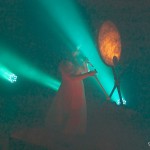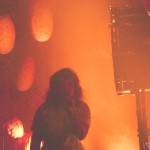To quote a King-Hell favorite son of Eris and a sporadic — albeit volcanic — lover of the muses, “When the going gets weird, the weird turn pro”; such a mantra falls into that rhetorical no-man’s land, between those who think it applies to them, and therefore constantly batter it upon the rocks of banality (spotting a homeless man, after a virgin reading of Fear and Loathing [any of them]: “When the going gets weird, the weird turn pro…”) or those who know for a fact that it may very well never apply to them, and therefore turn a legitimately helpful piece of advice into an anecdote, bizarre gibberish from one of God’s strangest creatures.
Those with the correct set of eyes and the right mind know that the phrase is best used for days like May 3, Two-Thousand and Thirteen, a day that began in a haze and ended in a cloud, roiled by strange phone calls from strange places — Quincy, Massachusetts; Downtown LA; Southern Orange County, California — with one of the fuckers talking in that guttural modulated voice movie villains wear; on a day like today, under these circumstances, and with an assignment looming that evening, one finds one’s self with only two options: crumble and fold beneath the hulking bizarre weight of the Maniae’s assault, or turn pro. I am, above all things, a pro. That aforementioned muse fucker famously once called my favorite sporting event “Decadent and Depraved,” and as my homemade mint julep syrup cooled in the refrigerator and the Early Times sweats through its burgundy flesh in anticipation of the next day’s race, I stood in the Metro, waiting for Canada’s own Purity Ring, chatting up the photographer whose works you see before you, the spitting image of the consummate professional.
Related Posts
A smattering of heavily trap-influenced rap songs and a few cuts from The-Dream smothered our conversation; this was a regrettable affair, but did constitute what the teachers and coaches like to call a “teachable moment.” Although anyone with a modicum of musical interest and a broader-than-one-genre approach can easily discern the rap/R&B influences in Purity Ring’s work, to have said influences pinned down and vivisected before you is still a rather illuminating experience. Most obvious are the drum lines, low, hollow bass hits rising like limbic eruptions, sending the snares into epileptic death rattles, and the pacing; take The-Dream’s “Falsetto,” whose shuffling, whoosh whoosh bottom end drags itself along with a sense of both desperation and pulchritude, like a luxuriously clothed model cut down at the legs, a pace echoed in Purity Ring songs like “Cartographer” and “Grandloves.” More esoteric is the appropriation of what I call the Pappademas Effect, which is to say that they pass the Pappademas Test, which is to say that when Purity Ring comes on, they push all other stimuli out of the listener’s mind, red shifting the listener’s reality, relegating it to the edges of existence, and substituting their own universe it its stead; few forms of music are more adept at this than rap (indeed, the article I took this standard from is about Juicy J and Project Pat’s Lex Luger produced “Pills, Weed, and Pussy,” wherein Pappademas states the following: “Sometimes hip-hop can still sound like the only music in the world worth paying attention to. This is obviously a contextual illusion, but so is all music — it should crowd everything else out of the frame when you are listening to it, or else it’s worthless.”).
Being administered this lesson in popular music theory was a strange crowd, one befitting the day on which they had gathered, a teeming disparate mass. Petite, Cleopatra-banged brunettes and the callow, testosterone-drenched denizens typical of Wrigleyville intermingled with girls dotted with tattoos, some spilled upon their laps, so that they clung desperately to creamy thighs, with heads topped by masses of loose, black curls intertwined, in at least one case, with the screaming, lascivious pink of high school skateboarders and early punk rock adopters; a girl in a sequined jacket and pants that roared downward, from a hip cling anchoring to a gaping, heel-swallowing mouth, danced with a kind of sea buoy sensibility, arms lofted high and rigid, rolling with waves only she could feel (they were certainly not in time with the music); every essence of her being coquettishly whispered “designer drugs,” while the entire scene seemed to steadily be preparing to fling itself suicidally into depravity.
To those inclined to think analogously, the low, simmering viciousness which one could feel coagulating beneath surface is also echoed in Purity Ring’s work. Precious few bands could truly have their lyrics read sans music and rightfully be called poetry, and Purity Ring is among them. The poetry Megan James sings is Beautiful Violence, hauntingly pretty in the way of Yeats’ “The Second Coming (Slouching Towards Bethlehem)” or Tennyson’s “The Kraken,” but with a primordial, graphic passion as well: “They’ll cover the hills/With their sweet flesh/And soft nails/They’ll cover the doors/With the screens/That their minds disposed,” James sings on “Cralwersout.”
“They’ll weave their own souls/Into the frame/To grow their foliage in/They’ll sew their own hands/Into their beds/To keep them crawlers out” … Dear God, it makes the blood run cold.
Things came to a head, as they often do, directly ahead of James and bandmate Corrin Roddick’s arrival, as a particularly energized blonde, in black TV set glasses and tights acid-washed so as to be tear-stained with wispy clouds, took umbrage to an apparent encroachment upon her space, the space she had effectively carved out with flailing arms and flexing knees, pushed back and earned from the crowd, like a center in the low post, with her ass and thighs, and responded by careening and ricocheting off those around her, with a purposeful brutality she had been lacking before, at one point sinking her nails into my clavicle and almost ripping me off of my feet in a display of the preternatural strength one only accumulates through the combination of heavy intoxication and a deep-seated sense of entitlement and movement; it is not easy, mind you, being the professional when things get weird.
James and Roddick arrived born upon sound and fog, a state in which they would remain almost constantly for the duration of the performance. Every action was shrouded in a colorful miasma, dotted with lamps seemingly ripped from a man-o-war which traced Roddick’s playing and lanterns which hung sadly when not emitting their own ghostly glow; combined with James’ spectral white dress, which, when back-lit, revealed her form beneath it, and the solid forms materializing from the prismatic mists, there was crafted l’aesthetic de naufrage d’etoile, one of those nebulous feelings best described in butchered, sewn together French or hyper-specific if ugly German, a thoroughly unreal physical presence that stood in juxtaposition to the undeniably powerful music that was emitting from that strange cloud.
With banter and pause almost nonexistent, the music — already all-encompassing and universe creating — became the world, the loping crawl of “Cartographer” drowning all in a pallbearer shuffle, or the twinkling exhalations of “Ungirthed,” combined with the brief, jumping-then-extinguished life of Roddick’s lamps, creating a sense of spritely wonder. The haunting lust of “Lofticries” birthed a throbbing reaction in the crowd, the floor seemingly heaving with the deep, ragged breaths the song inspires.
James was in turns both statuesque and fluid, bouncing from rigid, doll-like regality — during the driving “Bellispeaks,” she mounted a platform and stood above us, bathed in rapeseed, Queen of the Nebula — to a slow, fluid skirt twirling, as if underwater. Her vocals danced and flitted across the soundscapes presented her, an impossibly delicate glass cutter one moment and a powerful scoring wind the next; the only respite — indeed, the only time the magic was dropped at all, and Purity Ring appeared to be people, rather than beings — was for a cover of Soulja Boy and Esther Dean’s “Grammy,” which both ably demonstrated their ability to hew closer to a pop structure, as well paid homage to the heavy hip-hop influences that lace their own work.
The evening closed with “Fineshrine,” a piece that serves as a microcosm for all that makes Purity Ring great; stuttering, dance-inducing drums, sweeping synths, ghastly-yet-pulchritudinous lyrics (“Crawl up in my sternum and pull/My little ribs around you”), all of which James and Roddick teased and gathered up multiple times, bringing to climax at least twice, before dropping away. The corona dissipated; the lights came up, Kendrick Lamar’s “Backseat Freestyle” came on, and Purity Ring faded as if ghosts, leaving behind glistening flesh to tremble in the night air.
—
B. David Zarley is a freelance writer based in Chicago. You can find him on Twitter @BDavidZarley.



